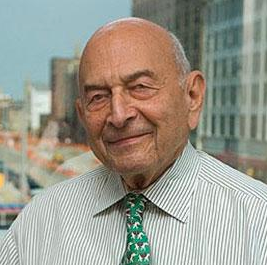Member-only story
Plan The Most For Those With The Least: Remembering Norman Krumholz
The urban planning luminary, who passed away in December, left a legacy that still impacts the profession today.
Three houses in a row had plywood nailed up over the windows, their early spring yards already showing signs of overgrowth. It was a cool, damp Saturday morning in Cleveland, and the few people who were outside in the neighborhood had skeptical looks on their faces as a group of a dozen students walked by.
At the head of the group, markedly, was an elderly man, wearing slacks and a windbreaker. He did not move quickly, but whether that was due to age or by design for this walking tour, it’s hard to say. He chatted amiably with his young cohorts as he walked, stopping every minute or two to point out to the group some point of interest he wanted to impress upon them.
This was 2007, roughly a year and a half before the housing market and banking industry would send the American economy into full-on free-fall. But in the neighborhood in which the group walked, the signs of what was to come were already painfully evident. This was a place that had seemingly been left behind, a place where disinvestment and disinterest from local leaders had wreaked havoc for decades.
And that’s why the kindly, grandfatherly-looking man had brought the students there. To rouse them from their privilege and their cocoons of ignorance. To make the struggles of their future profession plain and immediate to them. To illustrate the lessons he was trying to teach in a way that words spoken in a classroom or printed in a book never could.
I’ll never forget that morning walk through the Fairfax neighborhood of Cleveland. It was the day that Norman Krumholz, godfather of the equity planning movement and a giant in urban planning circles across the country, set my career on the course it still follows to this day.

Krumholz was just a couple of months shy of his 80th birthday that day in 2007. After having served as the planning director in Cleveland from 1969 to…
